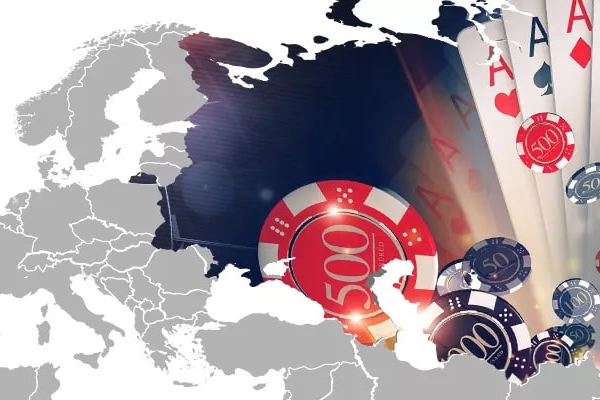Eastern Europe holds the potential for both success and frustration. While some countries have liberal regulations and newly re-regulated markets, others exploit the gambling industry with skyrocketing taxes, constrain it with tight restrictions, or ban gambling and betting outright. Keep reading for a rundown of which markets to keep an eye on in 2021.
The gambling industry has been a topic of interest in Eastern Europe for many years. After the dissolution of the Soviet Union, countries in the region were free to make their own choices.
Eastern Europe is — and always has been — a region of great risks. Regulations change, laws are passed and repealed, and as one country lifts restrictions, another introduces them. But plenty of operators have found success in the region, and it will continue to offer savvy gambling providers opportunities to grow and prosper.
Staying informed is key. To help you keep up with the times, we have decided to briefly talk about the history of the industry in the region and the current situation in Post-Soviet countries as of the beginning of 2021.
Russia
The history of gambling in the Russian Federation is full of twists. At the beginning of the 2000s, gambling was completely unrestricted. Slot machines could be found not only in gambling halls and casinos but even in public spaces and convenience stores. The industry’s unfettered operation at the time gave it a poor reputation in the eyes of the public.
Early attempts at regulation were not successful. For example, in the 90s in St. Petersburg, there was an initiative to make all gambling enterprises partially state-owned so that proceeds from the industry could be used for public needs. However, when the system was put in place, operators reported no earnings, and the project failed. One of the authors of this unsuccessful initiative was Vladimir Putin, who in 1999 became Acting President of the Russian Federation.
Expectedly, the head of state with a record of criticizing gambling cracked down on the industry, and by 2009 most games of chance were outlawed. Land-based casinos were permitted only in specially designated gambling zones: Azov-city in Krasnodar Krai, Altai, Kaliningrad, and the Far East.
The designated zones did not reach the level of prosperity expected of them. The gambling industry, which was booming at the beginning of the 2000s, dwindled as the blanket ban came into force. While demand was huge, gamblers were not interested in traveling to out-of-the-way regions. The zones were located far from big cities, had little to no tourism industry, and lacked necessary infrastructure, so for a vast majority of players, it was simpler to travel to a neighboring country or content themselves with a less-glamorous offering of black market casinos.
Azov-city, the first gambling zone to open, was liquidated by 2018, costing investors 3.3 billion rubles that will never be repaid. Neither Altai nor Kaliningrad have ever shown spectacular results.
The Primorsky zone, located in the Far East and owned by a Taiwanese company, prospered by attracting tourists from South Korea and China instead of focusing on the local gamblers.
A new zone (to replace Azov-city) was opened near Sochi to take advantage of the existing infrastructure which was created for the 2014 Sochi Winter Olympics, and promised to take advantage of the existing tourism industry. However, generally speaking, the zones proved to be risky and frustrating for investors, and not as lucrative and stimulating for the government as was anticipated.
Needless to say, the worldwide shift from land-based to online gambling — which has been accelerating in the last couple of years — wasn’t felt in the country, as online casinos are completely illegal.
One form of gambling that was relatively untouched by all this used to be betting. Bookmakers and operators of parimutuel betting can be licensed and work legally in the country, even outside of the gambling zones.
However, when the 2020 crisis hit the Russian sports industry, new regulations aimed to support it by utilizing the betting industry.
Bill № 1055657-7, “On Unified Gambling Regulator,” was introduced in November, swiftly passed into law in December, and signed by the president on December 30th.
The new legislation, which was described during the first reading as “defined by words ‘control’, ‘transparency’ and ‘increase in financing of Russian sports’”, aimed to introduce a single regulator for the gambling industry, unified systems for payment, and online monitoring, as well as a new way to calculate compulsory contributions that betting companies pay to sports organizations.
Of course, the law received a fair share of criticism for being full of terms and measures that were not particularly well defined. At the same time, it marks a novel direction for Russian legislation because to an extent, it’s inspired by Western regulations and aims to centralize and streamline the industry.
This trend is also supported by Decree No 706, which came into force in January 2021. This measure removes numerous outdated restrictions and requirements, making the Russian landscape a little easier for operators to navigate.
Belarus
For a while, the gambling market of Belarus prospered by catering to players from neighboring countries where gambling was illegal. However, in recent years, growth has subsided.
Even before the crisis, the industry was already in decline. The number of casinos, bookmakers, and slot-machine halls had been decreasing, year by year. Meanwhile, the government was reporting increased earnings from the gambling industry, achieved thanks to ever-rising taxes.
2020 was a rocky year for the country. After the crisis started, the land-based sector suffered even more, even though the Belarusian government didn’t impose strict lockdowns. Protests that erupted in Belarus in August were also extremely detrimental to the industry; the economy suffered, mobile internet connections were disrupted, and the public was too preoccupied to focus on entertainment.
If the government’s attitude changes and the situation in the country stabilizes, the market might start growing again, but at this moment it’s too early to anticipate any changes.
Ukraine
In 2009, all forms of gambling in Ukraine were banned, but the market recently opened back up. After 11 years, gambling was legalized again in the summer of 2020, kindling a considerable interest among local and foreign investors.
The new legislation allows for online and land-based casinos, betting shops, gaming halls, and poker rooms. Licensing requirements and fees are different for each type of business; in the case of land-based gambling establishments, they depend on geographical location. Our team here at Slotegrator covered the details in our recent webinar.
The legislation is still in fledgling form, the actual licensing process is only just starting, and there is a follow-up bill currently in the works to address some of the technical inconsistencies of the Gambling Act.
As one of the many promising regions for the gambling business in 2021, it is definitely a good idea for prospective operators and investors to closely monitor the situation in the country.
After its period of prohibition, the Ukrainian gambling industry is expected to become extremely lucrative. We will be reviewing the situation in Ukraine in more detail as it unfolds, so keep an eye out for our updates.
The Ukrainian gambling authority and its powers: latest update
The whole gambling community is fired up by legalization of gambling in Ukraine: it is expected to bring great new opportunities and change the geography of the gaming industry. The Slotegrator team is m…
The Baltics
Latvia, Lithuania, and Estonia are success stories when it comes to economic growth and development. Each of these countries has a fully legal and regulated gambling industry.
The Baltic countries are in a unique position — geographically, they are close to Russia and draw quite a lot of gamblers who find it easier, cheaper, and more enjoyable to travel there than to go to one of Russia’s remote gambling zones. And like many other EU member states, they have a solid legislative base and stable relationship between the government and the gambling industry.
In many neighboring countries throughout both the EU and the CIS, gambling advertising is severely restricted, and the Baltic states take a similar approach. Lithuania and Estonia allow some forms of advertising, while Latvia prohibits them entirely.
The recent crisis, of course, left its mark.
In Estonia, the national budget suffered due to the lack of expected tax revenues from the gambling industry, which caused the cancellation of several social and healthcare projects that depend on tax revenues for funding.
In Latvia, not only did the land-based sector suffer, but a ban on online gambling was implemented in the wake of the Latvian Coronavirus bill. The measure was later deemed unconstitutional, but the damage was done — the industry suffered an overall revenue decline of 45.5% compared to the previous year.
Lithuania fared better — in the first quarter of 2020, the decrease was just 2.8% because the drop in revenue from the land-based market was offset by increasing results from the online gambling sector.
Before the crisis, all three countries enjoyed growth, so it’s safe to say that the decline is temporary.
A license is still required to operate anywhere in the Baltics. Estonia forbids operators to enter the market without a local license, while Lithuania and Latvia recognize licenses issued by other jurisdictions. Authorities relentlessly block offshore websites that try to slip through the cracks, sending a clear message — illegal operators will not be tolerated.
Georgia
The gambling industry in Georgia has long been legal and enjoyed relatively few restrictions. Operators must have a local license, but the regulations themselves are not as strict as those in many other countries in the region.
The industry enjoyed booming growth over the past decade — turnover in 2019 was 200 times bigger than in 2009.
The main source of gambling revenues in Georgia is tourism. The country’s casinos attract players from Russia, Turkey, and other countries where this form of entertainment is banned or heavily restricted. Locals don’t gamble nearly as much; a 2014 report by Transparency International Georgia claims that only 6% of respondents engaged in gambling of any kind.
However, while Georgians initially didn’t show that much interest in wagering in public surveys, in 2019 some online casinos were in the top 10 most visited websites in the country, right beside Youtube and Facebook. The online sector grew immensely in the last couple of years thanks to unrestricted advertising. It should be noted, however, that these two halves of the industry are driven by the same operators — only holders of land-based licenses can offer online games and bets.
Light regulations and low taxes for operators have definitely been a polarizing political issue in Georgia, and many government officials were believed to have a financial interest in the countries’ largest casinos. Every couple of years the state is accused of turning a blind eye to illegal financial operations due to lobbying and corruption.
Despite all that, the situation remains stable. New amendments to gambling legislation entered into force in 2020 and the beginning of 2021, but the changes included won’t significantly impact the market — requirements for licensees were updated, new fines were introduced, and a new type of license is now available specifically for suppliers.
Overview of Asian gambling markets in 2021
Asia is always a topic of interest for international gambling operators — a region with many developed economies and home to 60% of the world population. Add to this a lightning-fast rate of digita…
Kazakhstan
Kazakhstan’s sizable Russian-speaking population ties the former Soviet country to its northern neighbor — the Russian Federation.
The gambling laws in these two countries are also very similar: casinos and slot machines are legal in a limited capacity, confined to the special gambling zones of Kapchagay and Shchuchinsk.
The online market isn’t altogether outlawed, but it’s not part of the licensing framework. Effectively, this means that there is no legal way to launch an online casino in Kazakhstan, but it’s not against the law to play on a foreign site. The government does not actively enforce the prohibition.
Previously, neither sports betting nor parimutuel betting were restricted to the designated gambling zones (another similarity with the Russian legislation), but starting from January 4, 2021 this has changed. Recent amendments to Law No. 356-VI entered into force, moving the bookmakers to the designated zones, introducing the unified registration center for bets that all of the wagers must go through.
While heavily restricted, the fact that gambling is legal at all sets Kazakhstan apart from neighboring Central Asian countries like Azerbaijan, Tajikistan, Kyrgyzstan, and Uzbekistan, all of which prohibit gambling completely. This positions Kazakhstan as a gambling oasis in the midst of other Muslim countries where there is (as always) demand but no supply.
Armenia
Armenia is politically and economically intertwined with both Russia and the EU (Armenia, together with Georgia, is considered European as per EU neighborhood policy and is a member of the EU Eastern Partnership since 2009). This country, located in the South Caucasus, has a regulated gambling market, and the government has been moving in the direction of increased regulation in the last couple of years.
The first step was an advertising restriction banning TV and internet advertising — with a few exceptions — and other measures soon followed.
Several amendments to the tax code were introduced in 2019 to compensate for the overall loss of government revenue with increased tax rates for alcohol, tobacco, and gambling enterprises.
The government also made clear its intention to limit or restrict bookmakers, which caused a wave of protest in the industry. Similar to Russia and Kazakhstan, special gambling zones were to be created in towns of Tsaghkadzor, Sevan, Jermuk, and Meghri. The effort seems to be driven by an idea to shift the gambling industry towards mainly catering to tourists and foreigners, while decreasing the Armenian public’s access to casinos and sports betting shops.
So far, because of the protests, the crisis, and other things happening in Armenian politics this hasn’t happened, and it remains to be seen if the trend towards tightening the restrictions will continue or reverse itself in the near future.
What’s next?
Industry operators and experts agree on one thing: it’s extremely important to have one’s ear to the ground. The Eastern European market is highly dynamic and subject to sometimes-unpredictable changes.
Each country has its own legal system and numerous political and economic factors in play that can influence the gambling market in one way or the other. Laws are written or repealed and economies boom and bust, but every year, opportunities open up, and those who follow the changes (or even anticipate them) can expect growth — and a payday.
Slotegrator works with companies all over the globe, including many operators in the post-Soviet countries, and we are happy to share our extensive experience with both those who are new to the market and seasoned operators looking to expand. Click the button below for a free consultation.
To receive a commercial offer, contact Slotegrator managers using the feedback form at the end of the article. Be sure to visit our Casino Gossip page to see other Slotegrator analytical articles.























